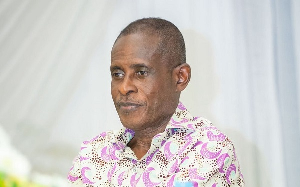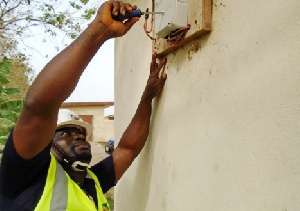The Central Regional Branch of the Public Utilities Workers Union (PUWU) has described the directive by the Power Ministry to the Electricity Company of Ghana (ECG) to exempt some state institutions from its ongoing mass disconnection exercise, as “shallow minded”.
The Union says “the directives shows our level of education and governance is not above 50% because every work in the country is important”, the Central Regional Branch Chairman of the PUWU, Seth Birikorang told Onua FM’s Yen Sempa.
In a bid to recover its debts; the ECG has in the past few days embarked on a massive disconnection exercise which has so far affected some institutions in the country including a Police barracks at Tema Community 8, and the newly inaugurated Ayensu Starch Factory, Komenda Training College, Ola Training College, Cape Coast Sports Stadium, Cape Coast Municipal Assembly, amongst others.
The Komenda Training College owes GHc115, 194.70, Ola Training College owes GHc348,607.03, and the newly built Cape Coast Sports Stadium owes GHC71,9792.56.
The rest are Cape Coast Polytechnic which owes GHc 1,017,542.04 and Ayensu Starch Factory for owing over GHC400,000.00.
A statement signed by the Deputy Minister of Power, John Abdulai Jinapor, commended ECG for embarking on the disconnection exercise, but has urged the power distributor to consider exempting health, educational and security installations from the disconnection exercise.
Reacting to the directive, Mr. Birikorang expressed surprise about the Deputy Minister’s statement, saying, “we must ensure equal and fair share of the national cake so if ordinary Ghanaians are paying their bills, why can’t the government institutions also pay”.
He questioned that if those coming to take over the ECG were to be around, would the Ministry have given such directives?
Mr. Birikorang said those who go to the hospitals pay for the utilities they use so the hospitals must be able to pay its bills.
“Those who go to the hospital are not treated freely. Even those under the NHIS are paying, what do they use the money for? When their NHIS cards expires they pay. Some treatments they tell you the NHIS does not cover so you have to pay money, where does the money go?”
He observed that all the woes of the ECG are political interference but the Ministry’s interference will not deter them from the disconnections.
General News of Monday, 4 July 2016
Source: 3news.com
Power Ministry’s ‘no disconnection’ order shallow minded - PUWU
Opinions












